
|
![]()
Greatest Films of the 1980s
1980 | 1981 | 1982 | 1983 | 1984 | 1985 | 1986 | 1987 | 1988 | 1989
Title Screen Film Genre(s), Title, Year, (Country), Length, Director, Description 


An American Werewolf in London (1981, US/UK), 97 minutes, D: John Landis


Arthur (1981), 117 minutes, D: Steve Gordon
Director Steve Gordon's romantic comedy told about a drunken, idle-rich NY millionaire with a dilemma - his father insisted that he would only acquire his grandmother's inheritance by agreeing on an arranged marriage to a wealthy, upper-class lovestruck heiress. In the film's introduction, alcoholic, spoiled millionaire playboy womanizer Arthur Bach (Dudley Moore) unknowingly picked up a hooker named Gloria (Anne De Salvo) on a street-corner. He answered her question about what he did for a living: "I race cars. I play tennis, I fondle women, but I have weekends off and I am my own boss." The next morning, Arthur's faithful, wise, loyal, sarcastic, reserved and poised butler-valet Hobson (Oscar-winning John Gielgud) found them in bed together. Arthur's extortionist father Stanford Bach (Thomas Barbour) discussed with his son his worries about his son's reputation as a "Millionaire Drunk Playboy." Arthur would be disowned or "cut off...from the money" if he didn't marry Susan Johnson (Jill Eikenberry) - the daughter of tycoon Burt Johnson (Stephen Elliott), his father's business acquaintance. However, Arthur stoutly refused but then conceded when his father threatened to withhold $750 million dollars. The wedding was scheduled for a month later. Then, Arthur saved lower-class shoplifter Linda Marolla (Liza Minnelli), after he saw her stealing a necktie in a department store Men's Department, and she was accosted outside the store by Bergdorf Goodman's security guard Chester (Irving Metzman). Arthur covered for her by claiming that they were shopping together, and it was an oversight that he hadn't paid for the necktie. Over time, Arthur asked Linda for dinner dates and a visit to an arcade, and soon learned that she was an aspiring actress who worked in Queens as a diner waitress. Arthur began to fall in love with Linda. The drunken Arthur experienced a strained dinner with his lovestruck fiancee Susan Johnson, and failed to convince her to drop their engagement. Meanwhile, Linda was encouraged by Hobson to attend the upcoming engagement party if she was serious about him, due to his suspicions that Arthur had feelings for her. She crashed Arthur's engagement party held at his father's estate. Arthur temporarily postponed his wedding to care for his dying butler in the hospital. Although Arthur was sober for the last month of Hobson's life, he went on a drinking binge following Hobson's death. The day of the wedding, the inebriated Arthur visited Linda working at the Queens diner to propose to her - and she accepted. After driving with Linda to the church, Arthur jilted Susan during preparations for the wedding ceremony, causing her angry father Burt Johnson to attempt to stab him with a cheese knife. Wounded, Arthur called off the wedding before passing out. In the empty church where Linda was tending to Arthur's cuts, his wealthy grandmother Martha Bach (Geraldine Fitzgerald) overheard them declaring their love for each other. When she heard Arthur vow to sacrifice his lifestyle for the love of Linda, Martha stepped forward and wouldn't allow him to live a life of poverty - he accepted her offer of $750 million. As a result, in the finale, Arthur requested his black Rolls-Royce Silver Wraith limousine driver Bitterman (Ted Ross) to open the door for him and Linda before a drive through Central Park: ("Bitterman! Do you want to double your salary?...Then, open that door!") - the last shot was of Arthur's personalized NY State license plate: ARTHUR.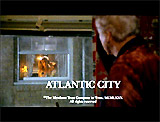



Atlantic City (1981), 104 minutes, D: Louis Malle
French director Louis Malle's tense, unsentimental, evocative and bleak character study was about an aging, has-been, small-time hood and numbers-runner named Lou Pascal (Burt Lancaster at age 68) who lived in the gray, depressing Atlantic City boardwalk area. Threatened to be put out of business by the casinos, he was forced to be the kept man of a miserly and abusive aging beauty queen - a feisty, broken-down gangster's widow named Grace Pinza (Kate Reid). His only source of escape and pleasure was secretively watching his neighbor - a younger, cynical oyster-bar waitress named Sally Matthews (Susan Sarandon), who performed a sexy lemon-wash of herself at her window within his apartment's view. She aspired to become a blackjack dealer/croupier in one of the more glamorous resort casinos in Monte Carlo. Their lives were turned upside-down when Sally's deceitful, estranged husband Dave (Robert Joy) and her eight-months pregnant sister Chrissie (Hollis McLaren) showed up on Sally's doorstep to sell a stolen shipment of high-quality cocaine. Lou befriended all three and promised he could sell the drugs due to his connections with the underworld. When Dave was killed by the former owners of the drugs in the Philadelphia mob, Lou was able to keep the stash to himself as a financial windfall. He finally was able to play the role of his vain dreams as a big-time, respected, confident gangster, however illusory and dangerous, and was able to woo and show lavish generosity toward Sally as her self-appointed protector. After killing two gangland hoods to protect her, he admitted his life was exaggerated up until then: "I never killed anybody in my life...But I did tonight", and he gleefully watched the report of the murders on the TV news: "Hey, that's me!...This story is going to be big all over the country: 'Gangland slaying rips apart Atlantic City!'" In the final sequence, Lou made a final promenade down the Boardwalk with Grace - with a panning shot up to a view of a wrecker's ball smashing into an apartment before the closing credits.

Blow Out (1981), 107 minutes, D: Brian De Palma




Body Heat (1981), 113 minutes, D: Lawrence Kasdan
Director Kasdan's debut feature film was this modern-day, twisting film noirish tale of a deadly and obsessive love triangle, involving adultery, murder, and a deceptive femme fatale. It was modeled after Double Indemnity (1944) and The Postman Always Rings Twice (1946). The highly-sexual tale was set in the heat of the fictional town Miranda Beach, FL, where tempting, smoky-voiced, sizzling and highly sensual femme fatale Matty Walker (Kathleen Turner) (with an elevated 'body heat' temperature) met simple-minded, small-town Florida attorney Ned Racine (William Hurt). Ultimately, the predatory female set her sights on him to help plot the murder of her wealthy husband Edmund (Richard Crenna) - and make him her accomplice. During their initial encounters, their conversations were laced with lots of verbal foreplay and double-entendres. In an erotic, steamy sex scene, Ned was about to leave Matty's mansion, but was enticed to reenter by an eager-looking Matty inside; he broke into her locked house through the lower porch's windowed doors with a garden lawn chair (to the sound of her wind chimes) to the awaiting, horny and receptive Matty as she laid back on the floor. Often, she inadvertently (but deliberately) kept referring to her husband's faults, her own unhappiness and how she'd wish her husband would die. She had mentioned that she had asked for a divorce, but a previous prenuptual agreement would leave her with little money. Fueled by his lust for both Matty's body and wealth, Ned conspired with her to plot the murder of her unsuspecting husband one night. There was a violent fight-to-the-death with Matty's husband during the botched murder in the hall of his opulent home. The body was transported in Ned's car trunk to Edmund's abandoned beachfront hotel, and burned to the ground (with a timer device that was rigged by Racine's ex-client and arsonist Teddy Lewis (Mickey Rourke)). Although police first suspected that an arson accident had taken the life of Edmund, recent alterations to Edmund's will (co-signed by Ned, and witnessed by Matty's visiting HS girlfriend Mary Ann Simpson (Kim Zimmer)) made Ned the prime suspect. [Note: It was later revealed that Matty had forged Edmund's and Ned's signatures on the documents, to inherit all of the estate via an invalid will.] After Ned became suspicious, he forced Matty at gunpoint to enter her home's boathouse, that he suspected Matty had rigged with a similar explosive device. An explosion blew up the structure and presumably killed her. Ned - who was serving time in the Florida State Penitentiary for Matty's murder, finally realized that he had been duped. Matty had planted the body of Mary Ann Simpson (who slightly resembled her) in the boathouse before the explosion, and escaped with her own life. Matty had assumed the name and life of her friend - and presumably, the real "Matty" learned of the deception and threatened blackmail (and payoffs), but was then killed, and her body was stashed in the boathouse. This was confirmed for Ned in the startling conclusion when he saw Matty Tyler's picture in a 1968 high school yearbook, with her name displayed as "Mary Ann Simpson" (with the nickname "The Vamp" and her ambition: "To be rich and live in an exotic land").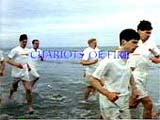


Chariots of Fire (1981, UK), 123 minutes, D: Hugh Hudson


Christiane F. (1981, W.Germ.) (aka Wir Kinder vom Bahnhof Zoo), 138 minutes, D: Uli Edel
Uli Edel's bleak and notorious coming-of-age film was based on an autobiographical 1979 memoir sub-titled Wir Kinder vom Bahnhof Zoo (We Children from Bahnhof Zoo). The story, set in late 1970s West Berlin, was about a real-life drug-addicted young teen prostitute named Christiane F. (Natja Brunckhorst). The cool tone of the film was reinforced by a David Bowie soundtrack (and midway through a live Bowie concert in a nightclub). The film-makers made extensive use of the actual locations mentioned in the book, including her home district of Gropiusstadt - a working class neighborhood or borough in southeastern Berlin that consisted mainly of social housing (drab, high-rise concrete apartments). She became hooked on heroin by her 14th birthday and began turning tricks and getting high at Bahnhof Zoo, West Berlin's then-largest train and subway station. Other locales included the city's modern "Sound" Diskothek where Night of the Living Dead (1968) was projected to teens, Berlin's seedy public toilets, and the roof of the Europa-Center (with a revolving neon-blue Mercedes-Benz sign).


Das Boot (1981, W. Germ.) (aka The Boat), 145 minutes, D: Wolfgang Petersen
German director Wolfgang Petersen's sympathetic and realistic, expensively-made anti-war film was faithfully adapted from the 1973 autobiographical book by war correspondent Lothar-Guenther Buchheim. The epic followed the heroic efforts of war-weary German U-boat captain (Jurgen Prochnow), known as Der Alte ("the Old Man"), and his desperate crew during WWII as they patrolled the North Atlantic and Mediterranean. They were confined and crowded in the claustrophobic, grimy, cramped insides of their U-96 undersea vessel, while being attacked from above. The harrowing and tense film included scenes of depth charge attacks, rivets popping during a deep dive maneuver, hull breaches that let in water, terror during an attempt to raise the damaged ship, and threats of asphyxiation and starvation.
Diva (1981, Fr.), 117 minutes, D: Jean-Jacques Beineix




The Evil Dead (1981), 85 minutes, D: Sam Raimi
Writer/director Sam Raimi's debut film was the ultimate "cabin in the woods" story about demonic forces in the woods (not really reanimated dead zombies). The hyper-kinetic film had very little dialogue, plot and character development, but incredible POV tracking shots. It was followed by two sequels: Evil Dead II (1987), and Army of Darkness (1992). In the story, Five Michigan State University students in their 20s, who were spending a weekend retreat in a rented, remote cabin in the Michigan mountains, inadvertently unleashed (or raised from the dead) dormant, demonic evil spirits from the ominous surrounding forest. With the discovery of a tape recording of potent incantations left by a professor who once lived there, and an accidental recitation of spells from a mysterious ancient Sumerian Book of the Dead known as the Necronomicon - they called up murderous spirits. After being raped by tree branches in a horrific scene, Cheryl (Ellen Sandweiss) was transformed into a demon zombie (known as a Deadite or Shemp) with a greyish white face and superhuman strength. The next to be possessed was Ash William's (B movie icon Bruce Campbell) sister Shelly (Sarah York). Scotty (Hal Delrich) died from massive injuries inflicted by trees when he tried to walk out of the area, while the next victim was Ash's girlfriend Linda (Betsy Baker). Cheryl (who had escaped from the cellar) continued to attack Ash as well as a zombified Scotty, whose eyeballs had to be gouged out. Only Ash escaped being violently possessed by 'evil dead' forces by film's end.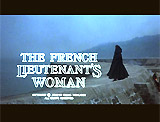


The French Lieutenant's Woman (1981, UK), 124 minutes, D: Karel Reisz


Gallipoli (1981, Australia), 110 minutes, D: Peter Weir




Gregory's Girl (1981, UK), 91 minutes, D: Bill Forsyth



Mad Max 2 (1981, Australia) (aka The Road Warrior (1982)), 94 minutes, D: George Miller
Writer/director George Miller's imaginative, post-apocalyptic action sci-fi (western) film was about a burned-out, ex-cop named "Mad" Max (Mel Gibson in a star-making role) (his last name from the first film in the trilogy, Rockatansky, was never uttered). The film's stark, naturalistic depiction of a post-apocalyptic future has been copied ever since by many other imitators. The entire film had the same formula as Shane (1953), The Magnificent Seven (1960) or a Sergio Leone 'spaghetti western', with Gibson providing the Clint Eastwood "Man With No Name" legendary hero - or anti-hero role. This sequel film, superior to the original film - an even darker revenge film Mad Max (1979), was followed by a nuclear post-apocalyptic sequel, Mad Max Beyond Thunderdome (1985), memorably featuring a co-starring role by rock star Tina Turner. In this comic book-styled B-film, the lone cop road warrior Mad Max (Rockatanksy) (Mel Gibson) stood as a lone figure on a highway amidst visions of a post-apocalyptic violent world. He wandered the barren, lawless highways of an Australian outback wasteland in his black super-charged Interceptor along with his Australian cattle dog. Living only to survive while dealing with anarchic crazies and violent road gangs, his main mission in life was to acquire enough precious petrol to keep nomadic. A flashback from the previous original film was presented with black-and-white newsreel footage - showing the murder of Max's wife and child by a biker gang. He eventually partnered or allied himself with a looney, comical Gyrocopter pilot, Gyro Captain (Bruce Spence), to help a small, besieged band of decent-living refugees or survivors (in an oil-producing colony), led by settler leader Papagallo (Mike Preston), who were defending a small fuel depot at the refinery. Max, the Gyro Captain, and the settlers were being relentlessly assaulted by a crazed, marauding wasteland warlord, the evil, hockey mask-wearing Humungus (Kjell Nilsson) and his horde of followers. Humungus knew that the colonists' objective was to locate a large semi-tractor rig to haul their fuel-filled oil tanker from the compound, in an escape 2,000 miles to "Paradise" on the northern coast. Max carried through on his promise to deliver a big-rig to haul the tanker, in exchange for gas. During his mission, Max was pursued by a punk crazy warrior - red Mohawk-haired Wez (Vernon Wells) and other Marauders, but was able to return to the compound with the Mack truck, with the Gyro Captain's aid. After stating that his work was done, Max deserted the colony and drove away from the compound in his Interceptor, but was soon overtaken by Wez (and gang members), and was seriously injured (and his car was destroyed). Back in the compound, the semi-recovered, still-wounded Max stumbled out of the infirmary and with a stunning change of heart (as a reluctant hero), announced to everyone that he would drive the Mack Truck (pulling the fuel tanker). At the same time, the other settlers would flee the compound (rigged with explosives) in the opposite direction in a convoy (including the school bus and other vehicles). The film concluded with a dazzling climax - with non-stop car action and amazing stuntwork. Max was viciously attacked at breakneck speed by a convoy of bizarre vehicles, souped-up cars and motorcycles, and the savage band of punkish desert vandals. At the end of the chase sequence, Max turned his Mack tanker truck around, and it crashed head-on into Lord Humungus' car coming from the other direction -- also killing Wez, who was clinging to the front fender of the tanker and was smashed between the two vehicles. It was then revealed, in the film's surprise twist, that Max's 40-foot tanker truck - allegedly filled with refined petroleum fuel ("precious juice") during the breakout drive - had been a decoy as a diversionary tactic. His fuel tanker was filled with reddish sand, while the gasoline had secretly been hidden in large drums stored in the school bus (and possibly other vehicles), allowing the small band of settlers to ultimately escape. The epilogue was conveyed by the same voice-over from the film's opening (from the Feral Kid (Emil Minty)). He described how the Gyro Captain (who succeeded Pappagallo) went North with the settlers as their new leader, and the Feral Kid (the grown-up Narrator) with his bladed boomerang eventually became the Chief of the Great Northern Tribe when the Gyro Captain died.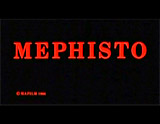

Mephisto (1981, Hungary), 144 minutes, D: István Szabó


My Dinner with Andre (1981), 110 minutes, D: Louis Malle



On Golden Pond (1981), 109 minutes, D: Mark Rydell
Director Mark Rydell's warm-hearted Best Picture nominated family drama was based on screenwriter Ernest Thompson's off-Broadway stage play - honored by Henry Fonda's first Best Actor Oscar win. In the cliched but well-acted story, adoring wife Ethel Thayer (Katharine Hepburn in the fourth Oscar-winning role of her career) was excited with her cantankerous, gruff, "old poop" 80-year-old husband Norman, Jr. (76 year old Henry Fonda in an Oscar-winning role and in his last film) as they drove up at the start of presumably their last annual summer trip to the location of their Golden Pond cabin, their New England lakeside vacation home in Maine. Ethel joyously announced that the loons were welcoming them home. The very vulnerable Norman was continually reminded that he was growing old, suffering from various ailments, and losing his memory. Norman became distressed and fearful at his failing physical and mental health (senility and death) when he momentarily lost his way in the woods and became disoriented and in a panic while picking strawberries. They were surprised by the visit of Norman's estranged and sole divorced daughter Chelsea Thayer Wayne (real life daughter Jane Fonda) with her new fiancee, 45-year-old divorced dentist Bill Ray (Dabney Coleman), and his 13-year old teenaged son Billy Ray (Doug McKeon) from Los Angeles - they were on their way to Europe. They would help celebrate Norman's 80th birthday. Throughout Chelsea's visit, Chelsea complained to Ethel about her father's condescending, overbearing, and unapproachable nature when she was with him. Ethel was critical of Chelsea, basically taking sides with Norman and not as sympathetic as she might be, and thought that Chelsea was equally cynical and had a chip on her shoulder. During summer fishing adventures (Billy was left behind when Chelsea and Bill went on to Europe for a few weeks), Billy (with Norman) attempted to catch a legendary 10-pound rainbow trout named 'Walter' (Norman called it "a crafty old son of a bitch!") - the lake's largest fish, and the two developed an affinity and camaraderie for each other during their crusade to catch the enormous fish. While fishing for 'Walter' one evening in the dangerous and rocky Purgatory Cove, Billy (at the wheel of the Thayer speedboat) crashed into a rock instead of reversing. In the near-fatal accident, Norman was catapulted into the water and received a gash on his head, and a worried Ethel was able to locate and rescue both them. When Chelsea returned from a month in Europe (Bill returned to LA), she confided to Ethel that she was now married. Chelsea predicted that her father would be unproud and unhappy about her marriage to Bill, although Norman seemed to have established a connection with Billy. However, in a heart-tugging scene at the dock, teary-eyed Chelsea awkwardly reconciled with her father Norman, and requested that they begin a new more reasonable father-daughter relationship. The afternoon scene culminated with Chelsea eagerly showing off by doing "a real goddamned back-flip" from the diving board for an appreciative Norman. When Chelsea was departing, Norman presented her with one of his old, second place diving medals from his days at Princeton - a symbol of their new relationship as she called him "Dad" for the first time. In the film's final scene, the last day for the Thayers at Golden Pond, when packing and loading boxes, Norman collapsed due to angina. After Ethel gave him his life-saving nitroclycerin medication, they discussed the reality of death. The film's final lines of dialogue came as they walked to the edge of the lake and stood there before leaving, when Norman now noticed and heard the loons on the lake possibly saying goodbye - he compared themselves to the last two remaining loons.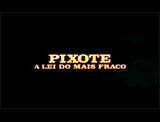

Pixote (1981, Brazil) (aka Pixote: A Lei Do Mais Fraco, or Survival of the Weakest), 128 minutes, D: Hector Babenco
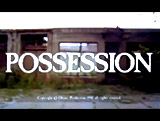

Possession (1981, Fr./W.Germ.), 124 minutes, D: Andrzej Zulawski
Director Andrzej Zulawski's experimental and avant-garde work was an unusual hybrid - a surrealistic and bizarre occult horror film and a domestic marital drama with doppelgangers. Much of the film was deliberately shot in the early 1980s during the tense Cold War, right along the Berlin Wall in the Kreuzberg section of West Berlin. It was a perfect allegorical reminder of the time when the entrapping Wall, close to the evil Communist world, still split and scarred the land and its people. The symbolically-told story was about tormented young French femme Anna (Isabelle Adjani) engaged in a self-destructive, disintegrating marriage to husband Mark (Sam Neill). The alienated rival spouses shared an apartment in East Berlin within view of the Wall and were slowly driving each other apart. Finding herself in a tortuous love triangle, Anna's tortured id created a supernatural, wormy-tentacled, lizardy, monstrous creature. She kept it as her 'secret lover' for sexual fulfillment in a second sparse and rundown Kreuzberg apartment. In the film's most famous sequence, Anna experienced a five-minute hysterically-screaming, miscarriage-birthing flashback sequence in a deserted, echoing Berlin U-Bahn subway station tunnel in which she writhed, convulsed and tossed her bag of groceries against the wall.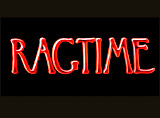

Ragtime (1981), 155 minutes, D: Milos Forman
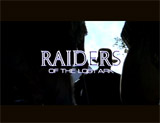


Raiders of the Lost Ark (1981), 115 minutes, D: Steven Spielberg
Director Spielberg's thrilling, entertaining action-adventure film paid homage to 1930's cliff-hanging adventure serials/films at Saturday matinees. It has become regarded as one of the greatest action films ever made - and led to a trilogy of sequels: Indiana Jones and the Temple of Doom (1984), Indiana Jones and the Last Crusade (1989), and Indiana Jones and the Kingdom of the Crystal Skull (2008). The main protagonist hero was mid-1936, pre-WWII comic-bookish, globe-trotting, bull-whip toting adventurer/archaeologist-treasure hunter Dr. Indiana "Indy" Jones (Harrison Ford) who was searching for rare antiquities. In the white-knuckle opening sequence, the bull-whip wielding Indy was exploring in a South American (Peruvian) rainforest, where he entered a booby-trapped jungle cave to retrieve a fierce-looking but beautiful golden Fertility Idol artifact from an altar. When he snatched it, he set off a chain reaction of destruction (including poisonous blow-gun darts and arrows, and a threatening, giant rolling boulder). The idol was stolen by Indy's nemesis, a French archaeologist who was working for the Nazis, Dr. Rene Belloq (Paul Freeman), while Indy made a getaway from a tribe of Hovito cannibals to escape on an awaiting airplane. At Marshall College where multi-talented Archaeology Professor Jones taught, he was enlisted by two US Army Intelligence officers: Colonel Musgrove (Don Fellows) and Major Eaton (William Hootkins), to locate the gold-encrusted Biblical Ark of the Covenant (holding the 10 Commandments) before the evil agents of Hitler used its powers to win the war. The Nazis had been discovered digging in excavations on the desert outskirts of Cairo, Egypt in the ancient lost city of Tanis (at the Well of Souls) - the possible resting place of the Ark of the Covenant. In a race with the Nazis, Indy flew to Nepal, hoping to be reunited with his old Egyptologist mentor Professor Abner Ravenwood, who had acquired the head-piece (a gold medallion) to the staff of Ra that would help to pinpoint the exact location of the Ark. In Nepal, Indy became reacquainted with his ex-girlfriend Marion Ravenwood (Karen Allen) from 10 years earlier - Ravenwood's tough, hard-drinking, spunky and feisty gambling daughter, who managed a Nepalese saloon. She reportedly possessed (from her dead father) the valuable Egyptian headpiece artifact; it was revealed to be on a necklace around her neck. She expressed her hard feelings and anger over their former love affair by unleashing a solid right to Indy's jaw: ("I learned to hate you in the last ten years... I was a child. I was in love. It was wrong and you knew it!"). That night, four Nazi agents led by sadistic-looking, treacherous Nazi Gestapo Major Toht (Ronald Lacey) burst in, engaged in a shoot-out, and burnt down her bar while looking for the headpiece. After escaping the first of many life-threatening situations (with the medallion), the self-effacing hero and Marion partnered together. The two traveled to Egypt where Marion was kidnapped, and presumed dead after a truck explosion. It was a race against time to make the correct calculations about the Ark's location, since the Nazis, led by Belloq, had already found the map room at Tanis three days earlier. However, without the headpiece, it would be very easy to dig in the wrong place. Indy entered the map room, marked the Ark's exact location (in an ancient tomb at the Well of Souls), and began digging closeby to where the Nazis were excavating. In the historic tomb, Indy found himself surrounded by venomous snakes, before he was able to locate the Ark and bring it (enclosed in a wooden box) to the surface with ropes. To his surprise, he was greeted by Belloq and the Nazis, who absconded with the Ark; Marion (who was alive after all) was pushed into the chamber to join Indy as the pharaoh's tomb was sealed. The two found their way out of the chamber, and Indy was able to prevent the Ark from leaving on a plane bound for Berlin and Hitler. After the plane exploded, Belloq ordered the Ark loaded aboard a truck to Cairo (where it would then be flown to Berlin). Atop a magnificent white Arabian stallion, Indy excitingly pursued after the canvas-topped Nazi truck caravan carrying the Ark. He was able to successfully make his way onto the truck and into the cab, and then drove the truck to a different hiding place. The Ark was placed in the cargo hold of a tramp steamer, where both an exhausted Marion and wounded Jones were passengers. The Nazis overtook the steamer via submarine, repossessed the Ark, and took it to a mysterious island in the middle of the Aegean Sea, in preparation for an elaborate Nazi ceremony that involved opening the Ark. In the climactic finale, the captured Indy and Marion were tied back-to-back to a pole-stake, and watched from a few hundred feet away, although Indy warned: ("Don't look at it. Shut your eyes, Marion, and don't look at it, no matter what happens"). God's fiery vengeance was visited upon the Nazis after Belloq opened the Ark's cover. Fire consumed him and his body exploded, while piercing firebolts and shafts of fire zapped the rest of the Nazis through the heart. Marion and Indy were the only two survivors. In the film's epilogue, the Ark (packed inside a wooden crate) was delivered to Washington, DC and was filed away in a massive government warehouse where there were hundreds of similar cartons.



Reds (1981), 200 minutes, D: Warren Beatty
Director Warren Beatty's sprawling and overly-ambitious political biopic was an ill-fated, sweeping, and tumultuous love story between American journalist-activist John "Jack" Reed (Warren Beatty, the producer/director/co-writer), a naive yet charming radical revolutionary, and strong-willed aspiring writer-photographer Louise Bryant (Diane Keaton with a Best Actress nomination). She abandoned her dull dentist husband and middle-class, provincial life and followed the idealistic Reed and other leftist bohemians and free-thinking members of the intelligentsia to Greenwich Village and Provincetown. As a feminist and advocate of free love, she had an intense romance with Reed (involving many spats, partings and reuniting make-ups, due to their frequent separations). The assertive Louise became frustrated and self-angry at being underappreciated and marginal to Reed's heroics and fame, and she made efforts to strike out and establish her own identity. In a side-plot, Louise engaged in a brief, but tumultuous summer affair with playwright Eugene O'Neill (Jack Nicholson) - in the love triangle, he served as a rival for Louise's affection. O'Neill glibly provided a 'devil's advocate' counterpoint to the romantically-idealistic viewpoints of revolutionaries Louise and Reed. She secretly married Reed, and then sparks flew when they worked together in Russia during the Bolshevik Revolution and Reed wrote Ten Days That Shook the World, but soured once their lives as writer-colleagues ended. She was loyally propelled back into the arms of Reed at the Moscow train-station - the film's finale, but he was soon on his death-bed.

Whose Life Is It Anyway? (1981), 119 minutes, D: John Badham
This provocative film asked the question: Does a patient have the right to choose to die? 32 year-old gifted sculptor and art teacher Ken Harrison (Richard Dreyfuss) suffered horrible injuries following a car crash - a severed spinal cord. After six months, it was determined that he was paraplegic and paralyzed from the neck down. On a life-support machine in ICU with cameras monitoring him, he came to the conclusion that he wanted to die, if he could only get the hospital to discharge him. He told his dedicated girlfriend/dancer Pat (Janet Eilber) that he was terminating their relationship - and that he wanted her to regard him as dead ("I don't want to go on living like this"). Nonetheless, he kept an acerbic sense of humor, but mostly with one-liners about his 'vegetable' condition and his sexual impotence. The strict and stubborn Chief of Medicine Dr. Michael Emerson (John Cassavetes) was opposed to Harrison's wish to die, judged him to be too clinically depressed (and therefore incompetent) to make a logical decision, and injected him with Valium (against his wishes) to keep him comfortable and less anxious. Another physician Dr. Clare Scott (Christine Lahti) eventually came to be sympathetic and agree with Harrison that he had a right to decide his own fate. He was also supported by free-spirited, black orderly John (Thomas Carter) with a love of reggae music, and pretty young novice nurse Mary Jo Sadler (Kaki Hunter). The embittered Harrison hired personal injury lawyer Carter Hill (Bob Balaban) to represent him in a right-to-die case. He wanted a final ruling on whether he could legally be forced (or not) to stay in the hospital for treatment. The judge in the case, which was held in a hospital office, was Judge Wyler (Kenneth McMillan). The hospital countered Harrison's wishes by threatening to order him involuntarily committed (under the Mental Hygiene Law) to remain in the hospital. Harrison's lawyer argued that he was being held without his consent, by bringing a pre-emptive action against the hospital with a writ of habeas corpus. The hospital's psychiatrist Dr. Jacobs (George Wyner) agreed with Dr. Emerson's adversarial position. Harrison defended his right to die in an eloquent speech, by claiming that he was completely helpless and imprisoned inside an already dead body. The Judge finally decided that Harrison could remain at the hospital, but remove his life-support and dialysis, meaning that he would die within a few weeks.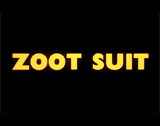

Zoot Suit (1981), 103 minutes, D: Luis Valdez